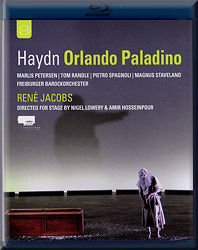|

Support
us financially by purchasing this disc from |
|
|
|
|
|
Joseph HAYDN (1723-1809)
Orlando Paladino - Dramma erocomico in three
acts (1782)
Marlis Petersen - Angelica; Tom Randle - Orlando; Pietro Spagnoli -
Rodomonte; Magnus Staveland - Medoro; Sunhae Im - Eurilla; Alexandrina
Pendatchanska - Alcina; Victor Torres - Pasquale:
Freiburger Barockorchester/René Jacobs
rec. Staatsoper Unter den Linden, Berlin, 8 May 2009
Sound Format PCM Stereo, DTS-HD Master Audio 5.1 Surround; Picture Format
16:9, 1080i; Region Worldwide: Subtitles in English, Italian, German
and French
Blu-ray Video
Reviewed in surround
 EUROARTS 2057784 EUROARTS 2057784
[168:00]
Haydn operas are not standard fare in the concert hall or opera house
nowadays, despite his lifetime success in this genre. Here we have
a musical masterpiece of the first order, comparable to Mozart in
many respects. However, Haydn himself did say 'hardly any man
could stand comparison with the great Mozart'. After this and
Armida a year later he proceeded to almost ignore opera.
He did write one more, L'anima del filosofo in 1791
but it was not performed in his lifetime. Viewing this curious confection
one can see why he focused on other types of music. The problem is
his choice of plot. This is that rarest of genres, a heroic-comical
drama. Haydn had already mixed the conventions of opera seria
and opera buffa in earlier works. After viewing you might
be tempted to call this opera montypythona. The libretto
is derived from Ariosto's epic poem Orlando furioso
from 1532, previously set by Lully, Vivaldi, Handel and others. Haydn's
version is extremely hard to summarise but in essence the plot is
this. The King of Barbary, Rodomonte, is infatuated with Angelica,
the Queen of Cathay. He is determined to protect her from the madly
jealous Orlando, Paladin of France. Angelica, not appreciating Rodomonte's
attention, uses the services of the sorceress Alcina to protect her
from Orlando. Medoro is in love with Angelica and is seen by Orlando
as the only impediment to possession of Angelica. There are clashes
between King Rodomonte and Paladin Orlando over Angelica which do
not serve to settle anything. When Medoro and Angelica are confronted
by Orlando only the distraction of a sea monster - here a big pair
of scissors! - stops his ferocious attack. When Orlando's fury
is directed at Alcina, she, being a sorceress, turns him to stone.
Whilst he is still in her power she washes away his madness and returns
him to human form. This act resolves the problem because Orlando and
Rodomonte then settle their differences. It is now safe for the lovers
Angelica and Medoro to be united … as are the sub-plot lovers whom
I have not mentioned to keep it simple! I repeat, the problem is the
story. Mozart avoided the problem by not choosing such bizarre plots,
even Cosi fan tutte is not quite this incredible.
What is any modern director to make of this farrago? The directors
are Nigel Lowery and Amir Hosseinpour and they opt for a pantomime
approach with strange costumes, bearded ladies and a general sense
of dreamlike oddness set in a landscape of cartoon castles, miniature
woodlands and strong hints of a pythonesque madhouse. Notably, Alcina
the sorceress wanders the stage with a distracted air of one high
on drugs. It takes a while to adjust to this concept and there are
no explanations in the notes, but be assured it has a sort of lunatic
consistency and there is always Haydn's fabulous music. The
cast join the directors’ vision as if they believe in it and display
wonderful virtuosity and panache in the many arias and accompanied
recitatives. Marlis Peterson is spectacularly good as the much-put-upon
Angelica and as mentioned, Alexandrina Pendatchanska as Alcina,
puts in an inspired piece of characterisation as well as virtuoso
singing. Sunhae Im looks like a cross between a Japanese tourist and
a confused schoolgirl but sings the role of Eurilla the Shepherdess
(don't ask) quite beautifully. No praise is too much for the
Freiburger Barockorchester. They quite rightly have the highest of
reputations for their playing under director Réne Jacobs on many other
recordings, for example of Don Giovanni and La Clemenza
di Tito. Here they show as joyful a response to the comedy, lyricism
and many dramatic effects of Haydn's opera as they did to his
oratorio The Seasons for Harmonia Mundi in 2004.
The sound and picture are absolutely top class. Note that there are
strange video ghosting effects in some scenes that I concluded were
actually on stage in the performance. There is, as usual, music over
the menus. When will we be freed from this curse?
Dave Billinge
|



 All Nimbus reviews
All Nimbus reviews








